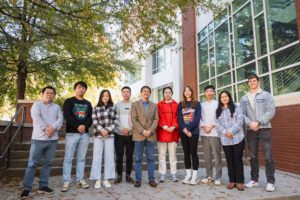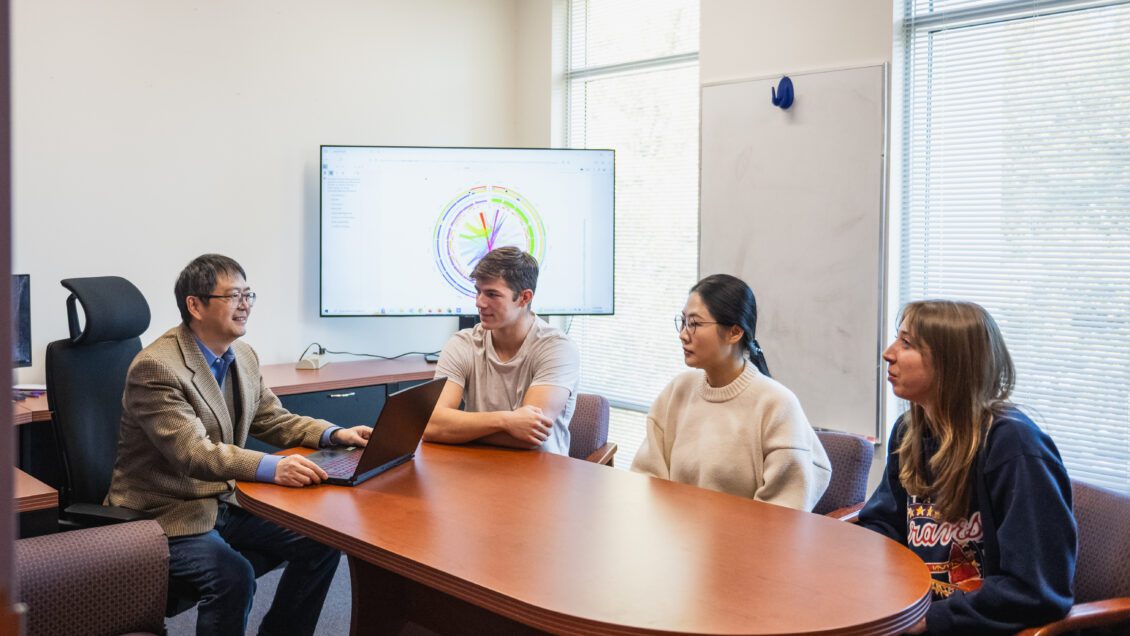A team led by Clemson University is receiving a second multi-million-dollar federal grant to continue research into the nation’s most devastating citrus disease, an arboreal affliction that costs Florida alone $1 billion annually.
Feng Luo, the Marvin J. Pinson, Jr. ’46 Distinguished Professor in the School of Computing, is the principal investigator on the project, funded with $4.1 million from the U.S. Department of Agriculture’s National Institute of Food and Agriculture (NIFA).

With the funding, the team will deepen its research into Huanglongbing (HLB), known commonly as citrus greening disease, which has posed a significant challenge to citrus farmers.
Co-principal investigators on the project include: Yongping Duan and Matthew Mattia, both of the U.S. Department of Agriculture; Fred G. Gmitter, Zhanao Deng, Mark A. Ritenour, John M. Chater, Zhengfei Guan, Jude W. Grosser, all of the University of Florida; Olufemi Alabi of Texas A&M; and Chandrika Ramadugu of the University of California, Riverside.
Despite the severity of the disease, efforts to curb HLB’s spread and mitigate its effects have been piecemeal. The research aims to counteract the disease and ensure that the future citrus varieties developed are both hardy and economically viable for commercial production.
“At Clemson University, we’re dedicated to delivering a top-tier educational experience for our students while making impactful strides in research,” said Executive Vice President for Academic Affairs and Provost Robert H. Jones. “This grant, led by Feng Luo, exemplifies our ambition to push boundaries in research and, in the process, enact positive change both in our nation and globally. Our endeavors in addressing citrus greening disease underscore our commitment to transformative solutions that transform our world.”
HLB is a bacterial disease that affects citrus trees, leading to misshapen, bitter fruits and eventually killing the tree. It is transmitted by the Asian citrus psyllid insect. Since its arrival in Florida in 2005, citrus production has declined by more than 80% in the state.
The grant will enable Luo and his team to explore various ways of developing citrus cultivars that are highly tolerant or resistant to HLB. Cultivars are plant varieties that have been produced by selective breeding to be used by growers in cultivation.
By employing artificial intelligence algorithms, the team will be able to sift through the genetic information of citrus plants at a speed and precision unachievable by traditional methods. This not only accelerates the identification process of HLB-resistant variants but also ensures that the selections will enable sustainable production for the citrus industries.
The research builds on a previous study that began in 2017 and was funded with $4.3 million from NIFA, also with Luo as principal investigator. In that first phase, researchers demonstrated that citrus plants that are resistant or tolerant to HLB can be selected in commercial groves and breeding orchards for large-scale cultivation.
However, the selection and evaluation process still requires a long time, and the second phase will be aimed at finding ways to speed it up. Researchers also plan to use the second phase to transition from the lab to the field, conducting evaluations in Florida, Texas, and California to test the real-world efficacy of their findings.
“Our goal here is about more than scientific exploration,” Luo said. “It’s about practical solutions that can help growers more quickly. The selected citrus cultivars will be the most durable, eco-friendly, and cost-effective solution to this devastating disease so far.”
Gmitter said he was excited to collaborate on the project.
“Working alongside such a dedicated team, we’re channeling our collective expertise to identify citrus varieties that can stand tall against HLB,” he said. “Through our combined efforts and expertise, we’re aiming to develop solutions that are both scientifically sound and practically applicable in the field.”
Duan agreed.
“It’s truly exciting to collaborate with such a passionate team,” he said. “As we dive deeper into the genetic intricacies of citrus plants, this collective endeavor brings us closer to turning the tide against HLB and ensuring a prosperous future for our citrus growers.”
Get in touch and we will connect you with the author or another expert.
Or email us at news@clemson.edu

